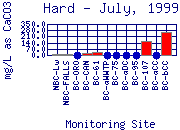 |
|
 |
|
HARDNESS
 Hardness is not measured at all points along Boulder Creek, so it is difficult to fully characterize trends.
In general, the hardness of Boulder Creek increases as it moves downstream (for example, see July 1999).
The hardness of mountain sampling sites was between 5 and 90 mg/L; the hardness of water in Boulder Creek after passing through the City of Boulder was between 30 and 130 mg/L; and the hardness in lower Boulder Creek was between 45 and 320 mg/L.
Hardness is not measured at all points along Boulder Creek, so it is difficult to fully characterize trends.
In general, the hardness of Boulder Creek increases as it moves downstream (for example, see July 1999).
The hardness of mountain sampling sites was between 5 and 90 mg/L; the hardness of water in Boulder Creek after passing through the City of Boulder was between 30 and 130 mg/L; and the hardness in lower Boulder Creek was between 45 and 320 mg/L.
![]() This increase is mostly due to changes in geology. In the mountains, Boulder Creek passes over granitic and metamorphic rocks.
These rocks donít weather very easily and so donít release many cations.
As Boulder Creek leaves Boulder Canyon and flows onto the plains, it flows over calcareous (calcite-rich) sedimentary rocks, and calcium is released to the waters, increasing hardness.
This increase is mostly due to changes in geology. In the mountains, Boulder Creek passes over granitic and metamorphic rocks.
These rocks donít weather very easily and so donít release many cations.
As Boulder Creek leaves Boulder Canyon and flows onto the plains, it flows over calcareous (calcite-rich) sedimentary rocks, and calcium is released to the waters, increasing hardness.
 The flow rate of Boulder Creek largely influences hardness in Boulder Creek.
>From April to September, flow in Boulder Creek is higher due to snowmelt runoff and thunderstorms.
The high volume of water dilutes hardness in the creek.
Hardness is often lowest in high-flow months such as June, July, and August (for example, see BC-61 in 1999).
The flow rate of Boulder Creek largely influences hardness in Boulder Creek.
>From April to September, flow in Boulder Creek is higher due to snowmelt runoff and thunderstorms.
The high volume of water dilutes hardness in the creek.
Hardness is often lowest in high-flow months such as June, July, and August (for example, see BC-61 in 1999).
 Spikes in hardness concentrations at lower Boulder Creek sites (for example, April 1999) may be due to some activity near the sampling point, such as water diversion and return, soil erosion, or construction, or from effluent from WWTPs along Coal Creek.
Spikes in hardness concentrations at lower Boulder Creek sites (for example, April 1999) may be due to some activity near the sampling point, such as water diversion and return, soil erosion, or construction, or from effluent from WWTPs along Coal Creek.

COMPARISON TO REGULATIONS
There arenít general water quality standards for hardness; however, hardness is used to calculate aquatic life water quality standards for several metals. See "Reg. 31- Basic Stds. & Methodologies for Surface Water" in the Colorado Department of Public Health and Environment Water Quality Control Division (CDPHE-WQCD) Regulations for information on using hardness in the calculation of metal standards.
Waters with a total hardness in the range of 0 to 60 mg/L are termed soft; from 60 to 120 mg/L moderately hard; from 120 to 180 mg/L hard; and above 180 mg/L very hard. Hardness in Boulder Creek ranges drastically at many sampling points. Water samples collected in the mountains and in Boulder Canyon are soft to moderately hard; samples collected downstream from the WWTP range from soft to very hard.